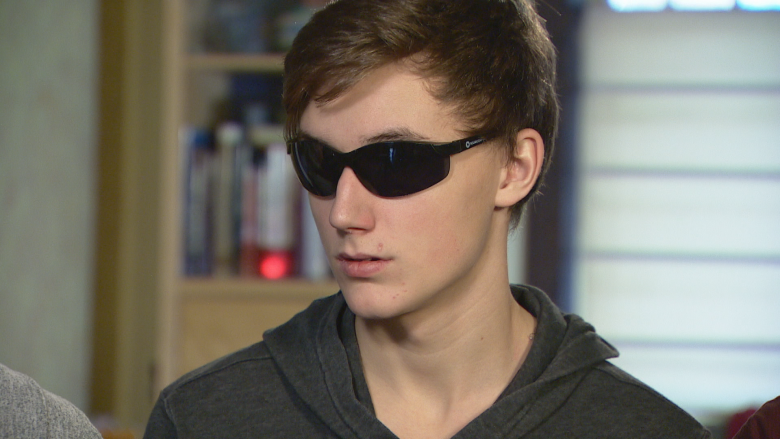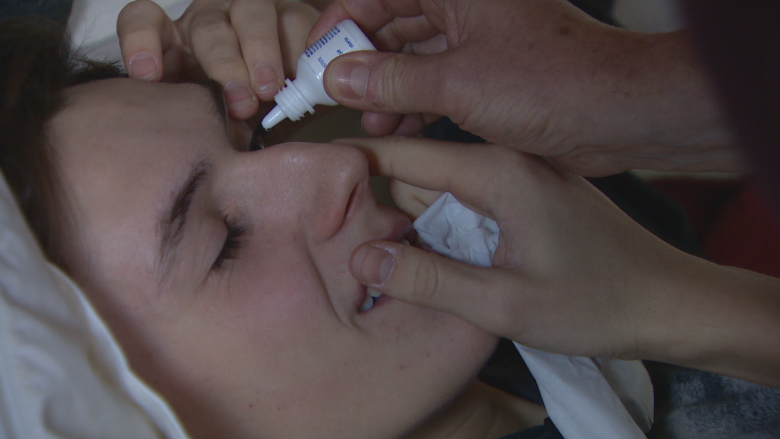OHIP wouldn't cover surgery to save teen from blindness
Ontario's health insurance program wouldn't pay for an operation to save the sight of a teenage boy, even though the procedure is covered in other provinces.
Aidan Wellsman, 16, has keratoconus, a degenerative eye disease that causes the cornea to thin and change shape. When he was diagnosed in late October, doctors in Toronto told Aidan and his family it would lead to blindness if left untreated.
"I was terrified," said his mother, Flora. "I was in tears, I was worried, I was panicked. All I kept hearing was that my son might go blind."
Aidan, a student at Lawrence Park Collegiate Institute in Toronto, first noticed bouts of blurry vision toward the end of the last school year, particularly when trying to read his teachers' writing at the front of the class. When he began Grade 11 in the fall, he could no longer cope.
"It started to get worse and worse — all the letters just started to fade together," said Aidan in an interview with CBC News. "I just couldn't read anything on the board unless it was really big writing."
Ophthalmology specialists told the family they were confident they could prevent Aidan from going blind from keratoconus with two surgical procedures: corneal cross-linking (to strengthen the corneal fibres weakened by the disease) and attaching corneal implants called Intacs (plastic inserts placed under the eye's surface to help reshape the cornea).
But the doctors also told the family that neither operation is covered by the Ontario Health Insurance Plan, leaving the Wellsmans to face spending $10,000 for the surgery at a private laser eye clinic.
"I can't believe that OHIP doesn't cover this procedure," said Flora Wellsman. "I'm shocked and appalled, frankly."
Aidan's father, Thomas Wellsman, said he was also shocked "to find out that something that could keep a young person from going blind wouldn't be covered."
He said he finds it "disturbing" that Ontarians suffering from keratoconus have to pay thousands out of their own pockets for surgery to save their sight. "For a large number of people, that would be devastating because they couldn't afford it," he said.
Flora Wellsman can't understand the government's logic. "It's $10,000 that would save a person's sight. If that person goes blind, they will have to go onto disability. And it would cost the government more to pay for that individual's disability than to just pay for the operation."
She has raised her concerns in writing with Premier Kathleen Wynne, who is the MPP for the family's neighbourhood in midtown Toronto.
An Ottawa family faced a similar challenge earlier this year when 13-year-old Balin Vergunst was diagnosed with keratoconus. CBC News found that some provincial health-care plans cover cross-linking surgery, but Ontario has been studying the issue since 2011.
Ontario plans review
OHIP does cover the cost of corneal transplants for people with keratoconus after they have become legally blind. The Wellsmans call this is a far less desirable alternative for Aidan, not only because he would fully lose his sight before he could regain it, but also because of the risks involved in a transplant.
The province is funding ongoing research into the effectiveness and cost-saving potential of corneal cross-linking and Intacs implantation. The researchers have indicated they will report their findings "in the near future," said Ministry of Health spokesman David Jensen.
"The ministry will then review the recommendations and determine whether there is substantive evidence for the procedure to become an insured service under the Ontario Health Insurance Program," Jensen wrote in an email to CBC News.
Even if Ontario changes course and decides to cover the operations, it will be too late for the Wellsmans. Aidan had the surgery last week at a Toronto branch of TLC Laser Eye Centres.
The family is taking advantage of the clinic's instalment plan, and friends have launched a GoFundMe campaign to help pay the surgery bill.
The Wellsmans' main focus now is on ensuring Aidan's sight is fully restored. Post-surgery, his eyes are highly sensitive to light, so he has to wear sunglasses much of the day. He also tapes plastic shields over his eyes at night to ensure he doesn't rub them and cause damage, and needs eye drops to prevent infection and help the healing process.
Aidan had been an honour roll student until his marks started to slip as he struggled with his sight. He's eager to get back to the extra-curricular activities he enjoys for which sight is essential, including lifeguarding and playing and refereeing hockey.
"Of course we're still not through it yet," said his mom. "Aidan still can't see right now, he's still recovering. But every day I tell myself it's going to be OK and we're going to get through it."




